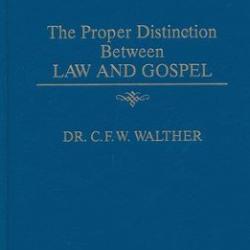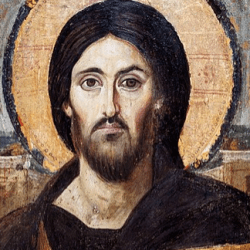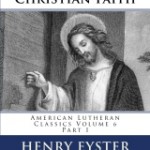Rod Dreher is one of my favorite columnists. I consider his blog at the American Conservative to be essential reading. Over the past couple of years he has been talking about something he calls the Benedict Option. He contends that Christians in America who take their faith seriously are basically going to have to take this option in one form or another. In this recently released talk, he sums up in some detail what he is advocating in under 20 minutes (answering questions and objections he has heard as well). I recommend watching it: when I send out an introductory message to my students taking the basic Christianity class I teach a few times a year, I will now be including a link to this video and encouraging them to watch it.
https://www.youtube.com/watch?v=VbItNogEOx4&w=560&h=315Here is a link to one of the earliest posts I remember where Dreher really started articulating his idea. A clip from that article:
“If I were a social or religious conservative who had money to donate, I would not give it to political causes. I would use it for strengthening our institutions as places of effective cultural resistance to the times we’re in, and the times that we’re entering. Make them function like the Benedictine monasteries of Western Europe did during the Dark Ages: as institutions and communities that bear and pass on our moral and spiritual vision in a time and place that does not share it, so that one day, far into the future, it will be there for rediscovery, and the rebuilding of society out of the ruins.”
At the time, all of this put me in mind of a longer piece I wrote about eight years ago called “A child at peace in the presence of his father: a Lutheran monasticism?” I will admit that to talk about Lutheran monasticism sounds like an oxymoron, but as I re-read it now, it is clear that the “light monasticism” that I was talking about here is basically analogous to what Dreher calls the Benedict Option.
Here are some clips from that piece, starting with the origins of monasticism:
“…if monasticism was not necessarily an un-Christian attempt to earn God’s favor, than what was it? Was it simply an all-out retreat from the world, as it is often characterized? This seems unlikely, seeing as how the writings and practices of the monks both indicate that they were still concerned to be “in the world” while not being “of” it. Gregory of Nanzianzus in his works endeavored to show that “the monastic profession is characterized by steadfastness in a way of life rather than by physical withdrawal”[1] The idea seems to have been that by embracing the monastic life, persons could be most fully equipped to fulfill a priestly, prophetic and royal ministry for the “life of the world.” (Some persons have even argued that it was not the “mainstream” institutional church but rather the monastics that created the Church’s impetus for missions and evangelism). “If you want to exercise the priesthood of your soul, do not let the fire depart from your soul”, Origin had said, and for some, this meant something akin to the monastic life was needed. (see here)”

My cultural analysis leading me to think such a thing may be necessary:
Bouncing between what seems to be the extreme of attaining material wealth and comfort (often smuggled in to definitions of “quality of life”) for all, and the other extreme of a spiritual liberty (spiritual power and comfort) that degrades the physical (particularly, the human body) men these days religiously strive for a “progress”, often operating in intellectual isolation from any possible consideration of any true progress that may be due to the Christian message (popularized in books like Alvin Schmidt’s “How Christianity Changed the World” or Vishal Mangalwadi’s “Truth and Transformation”). They do not seek to be found in a renewed creation in Christ, where they may more fully grow into a realization of what it means to be creatures made in God’s image. Instead, bolstered in part by the liberation the world has experienced because of the Christian Gospel, they fight against the ancient pagan notions of an unchanging natural order and fate in their own way. The worldly wiser among them do not reject notions of realism, for there is indeed “the world as it is”, even as there is also “the world as it should be”. Still, whether they atheistically embrace the material, seeing it as the only reality, or whether they seek liberation from the material in a more spiritual sense, they both see the need or imperative, now driven more so by new medicines and technologies, to liberate humanity from what it previously meant to be human. They will not “destroy the old man” in God’s way, through the Law and Gospel found in Christ, but rather via their own means, and to their own ends.
Further: all of this takes place as relationships are becoming increasingly atomized, self-focused. The Darwinian life that seems to be required of our persons in the ever-more demanding meritocracy which is our world lends itself to all manner of difficulties, leading to temptations to sin….
But the “private sector” (free market) is not the only one which has become increasingly oppressive. The same can be said for the public realm, the realm of those who govern. After all, families and churches, working hard where God has placed them, making a difference in “Good Samaritan” moments – especially remembering in Christ’s name the poor among them – being supported in their good deeds by a government set up to encourage such work, are not enough….

The attitude of these new “monastics”:
“We are too weak, feeble, and corrupt to resist the many temptations of this present age. The secular realm as it is currently imagined and hence constructed is becoming less and less Christian in its affections, and hence, it is becoming increasingly difficult for Christian faith to be communicated in words and deeds. The tempting enticements, multiplied a thousand times, and available from the privacy of our own homes at the click of a mouse, are too great. The churches themselves are focusing on Jesus Christ and the Scriptures which speak of Him less and less, and their worldliness increases daily. Temptation abounds as sin for a season has become sin for all seasons. Even if I flee the sins which so clearly destroy life, in my escape it seems in the popular consciousness I only find pagan solutions that while attempting to control the gross outbreaks of wickedness (family problems and otherwise), are wicked themselves in their idolatry. The world constantly teaches things which are at odds with what is true about God, about us, about the creation. I know there are those who tell me that there are good answers to these false assertions, but the lies sometimes sound persuasive, I feel my faith being choked out, and just trying to provide food and housing, I can’t afford an internet connection where I can get to Issues ETC.* : ) …
The world may call me lazy, unpatriotic, a poor world citizen, or even an atheist(!), but this is the truth – I am in need of more food. The Church may even call me selfish, but may I be “selfish” like a baby receiving nourishment at its mother’s breast. May I be like the trusting child who simply feels the need for more love. I need more growth in grace. I am in desperate need of these things, which I find so little mention of in the world! And why should I be surprised at such need? I need more, for I have missed not only the world’s mark (Paul: “as I try to please them in every way…”) but God’s – and I alone am the Chief of sinners. Like Isaiah, my own lips are unclean and I live among a people of unclean lips.”
Such would be the humility of the new monastics: “We are not strong, but we are weak. In Christ alone and in the shelter He provides are we strong. Only by being humbled to the point where we once again are set upon dwelling with, and remaining with the little babe could we even hope of fight the battle whose victory He has secured for His people”:
His camp is pitche`d in a stall,
His bulwark but a broken wall;
The crib his trench, hay-stalks his stakes,
Of shepherds he his muster makes;
And thus, as sure his foe to wound,
The angels’ trumps alarum sound.My soul, with Christ join thou in fight;
Stick to the tents that he hath pight.
Within his crib is surest ward;
This little Babe will be thy guard.
If thou wilt foil thy foes with joy,
Then flit not from this heavenly Boy.(Robert Southwell, This Little Boy So Few Days Old)
Now, some might argue that all of this is a bit ingenuous. After all, is this not actually implicitly saying that *we*, the ones who are choosing to separate ourselves, are the ones who are spiritually strong in the Lord?…
….The new monastics, especially, would be permitted to, in a very real sense, rest in their redemption in Christ. They would retreat from both storms external and internal into the shelter of His house. Like a baby as in a mother’s arms. Like the child playing at peace in the presence of his father. All striving for perfection, doing excellent work with the explicit goal of to promote Christ, sharing His Name upon “re-entrance” into the world, the “secular realm”, would necessarily spring from this truth. And since people, generally, do not know what their real needs are, perhaps this will shake them up enough to start catching a glimpse of just what it is they are lacking – forgiveness, life and salvation in Jesus Christ, the exact representation of God the Father.
FIN
*Thanks mom and dad (who are paying for our internet while they are overseas so they can chat with us on Skype)
Images: LGBTQ White House (White House Twitter feed), Gerard Van Honthorst painting (Wikipedia), Dreher (Rod Dreher’s Twitter account)













